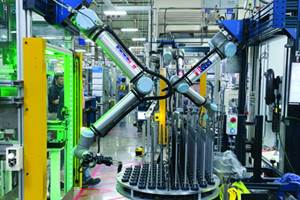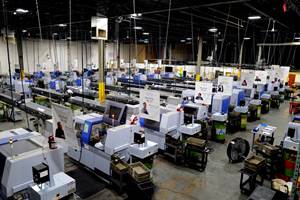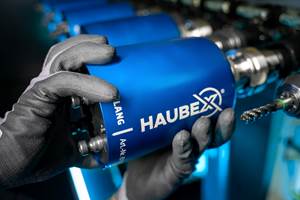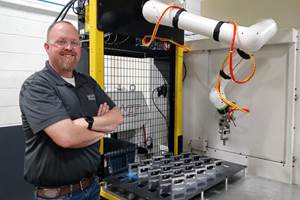3 Ways Artificial Intelligence Will Revolutionize Machine Shops
AI will become a tool to increase productivity in the same way that robotics has.
Not a day goes by without seeing another article on artificial intelligence (AI). It has become the buzz phrase of the last year. The problem with AI is that it gives many the same fear that robotics had in the past. The human mind quickly goes to a place where this technology is going to destroy mankind.
When robotics was introduced into the mainstream shop, people could not help but think robots were going to hurt them and take over the world. It seems like AI has developed the same kind of visual problem, as we fear AI could take over all our computer systems.
While this could happen if AI is not kept under control, I believe it is being closely monitored to prevent problems. Properly used AI will help revolutionize the machining industry and bring with it tools that will make our machine shops perform better.
AI is portrayed as having quick access to the entire world of information and technology. Combined with human knowledge, it can help us realize things that would have previously taken us a long time to do. AI can bring together relevant knowledge so much faster and enable decisions to be made very quickly. AI can also apply knowledge much faster than we could have in the past.
AI has the potential to revolutionize the way machine shops run and streamline processes for greater productivity and profitability. I believe that AI is going to make our shops better by improving three areas of our machine shops:
- Tool selection. These days, when we encounter different materials, we need to select the best milling and turning tools for the job. Unfortunately, research on the internet and via traditional methods such as salespeople and trade shows can be slow and limited. AI has access to the vast majority of the knowledge and experiences in the world. It can present tooling appropriate for our current task very quickly. This means we will be able to continually improve machining processes with the latest tooling. AI can also process evaluations of tooling very quickly from online experiences, and come up with lists of alternative tools if the initial recommended tooling is unavailable. This tooling selection via AI will make our shops much more productive.
- CNC programming. AI will help us program machine tools much faster that before. There is so much knowledge out on the internet in terms of programming strategies, and AI has access to all of it. It can evaluate programming practices much faster and adopt numerous strategies for getting a program just right. It may start by offering strategies that take into consideration certain attributes that we are looking for. This could be the balance between program cycle time and tooling longevity based on different materials. It will optimize tool paths much better than many of the canned cycles of today because it will consider many more variables with its access to more information. This does not mean that we will not be in charge of the programs, but we will have many more options and strategies that we do not have today. These options can then be balanced by what we think is important, and the AI can implement them.
- Machine vibration monitoring. There has been a lot of research done on machine vibration monitoring. We know that harmonics in machining truly affects performance and surface finish. Unfortunately many of the monitoring systems of today are rather manual and slow to get results. This means lots shops must go through lots of trial and error to find the right speed and feeds to minimize the harmonics and maximize performance. AI could truly begin to solve the slowness of this process. With built-in sensors put into a machine tool, we can have AI constantly tuning the machining process. It will also remember previous settings which it can use as baselines. I would think this would revolutionize the machining process by making machine vibration monitoring more mainstream. Machine tools could use AI to remove chatter automatically, while at the same time improve feeds and speeds to maximize productivity. Can you imagine an AI actively making your programs better from a speed and feed perspective based on active vibration/harmonics monitoring. The quality of parts and finishes would increase and cycle times could become much faster.
These three areas are only the tip of the iceberg of the things that AI can potentially improve in machine shops. AI is going to become a tool to increase productivity in the same way robotics has, and it is there to make our lives easier. If AI is looked at as a tool for increasing productivity, it should be a lot easier to embrace. We are always looking for ways to improve our machine shops, and AI will certainly help.
Related Content
4 Steps to a Cobot Culture: How Thyssenkrupp Bilstein Has Answered Staffing Shortages With Economical Automation
Safe, economical automation using collaborative robots can transform a manufacturing facility and overcome staffing shortfalls, but it takes additional investment and a systemized approach to automation in order to realize this change.
Read MoreInside the Premium Machine Shop Making Fasteners
AMPG can’t help but take risks — its management doesn’t know how to run machines. But these risks have enabled it to become a runaway success in its market.
Read MoreUsing the Toolchanger to Automate Production
Taking advantage of a feature that’s already on the machine tool, Lang’s Haubex system uses the toolchanger to move and store parts, making it an easy-to-use and cost-effective automation solution.
Read MorePartial Automation Inspires Full Cobot Overhaul
Targeting two-to-four hours of nightly automation enables high-mix manufacturer Wagner Machine to radically boost its productivity past a single shift.
Read MoreRead Next
The Cut Scene: The Finer Details of Large-Format Machining
Small details and features can have an outsized impact on large parts, such as Barbco’s collapsible utility drill head.
Read More3 Mistakes That Cause CNC Programs to Fail
Despite enhancements to manufacturing technology, there are still issues today that can cause programs to fail. These failures can cause lost time, scrapped parts, damaged machines and even injured operators.
Read More
.jpg;width=70;height=70;mode=crop)



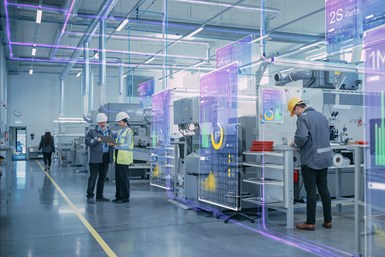

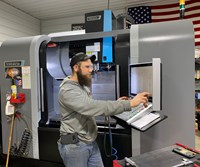




.png;maxWidth=300;quality=90)








